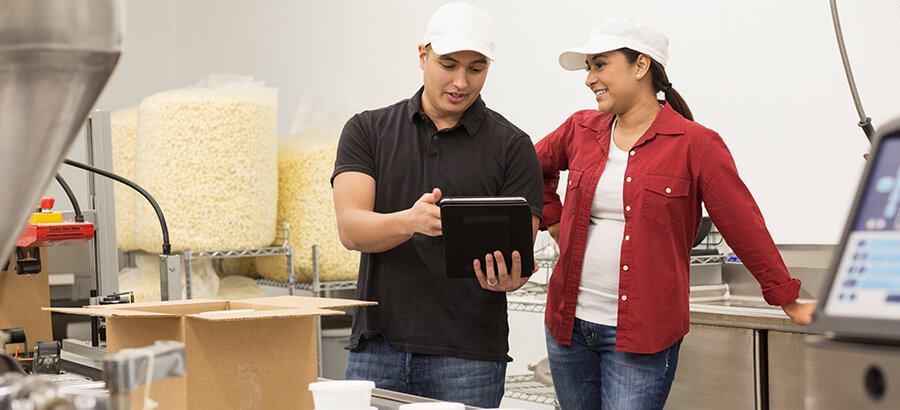 Empowered consumers, consumer bodies and increased regulatory pressure are driving the move to a much more tightly controlled industry. Even with all of the regulations, it is inevitable that sooner or later there will be some type of food incident requiring removal of that product. One of the key requirements is a full traceability system. Without an ERP system, a full product recall will be impossible to achieve in the expected timelines.
Empowered consumers, consumer bodies and increased regulatory pressure are driving the move to a much more tightly controlled industry. Even with all of the regulations, it is inevitable that sooner or later there will be some type of food incident requiring removal of that product. One of the key requirements is a full traceability system. Without an ERP system, a full product recall will be impossible to achieve in the expected timelines.
What is Expected of the Industry?
Government, business, and society have a role to play to improve the industry, but within the boundaries:
- Governments are tightening up regulations on food safety due to a number of well-publicized incidents
- The industry is trying to apply good corporate citizenship to ensure improved safety
- The internet, and especially social media, has transformed every consumer into a critic, and an expert on the industry.
Unfortunately, this tightened environment adds cost to the plate of food in front of us, while the unscrupulous food producer adds costs in line with the increased market pricing, and pockets the increased profits while not improving his processes.
One of the cornerstones of the improved system concerns the ability to undertake a thorough and timeous Food Recall. The success of the Food Recall is built upon the ability of the traceability system – that is, knowing where each ingredient is from, where it was processed, and where it ended up.
Consider modern refrigerated transport systems that can deliver any product anywhere in the world overnight. This means that seasons are now essentially irrelevant, and the only barrier to consumers eating what they want year-round, is price.
Why ERP?
Consumers increasingly want to know more about the product that they are consuming:
- Which farm did their egg or bacon came from?
- What did it eat? And drink?
And that’s just for starters!
Alongside the ‘taste’ revolution has come a growing interest in personal nutrition and overall health – people who understand that they are what they eat naturally want to know more about what they’re eating.
The other vital aspect of this revolution is food safety and its traceability. The recent case of Australian strawberries deliberately being contaminated with needles highlighted the need to be able to track a food item’s journey from farm to fork.
Traceability requires the ability to interrogate the business system, analyze the results and promptly execute a plan to mitigate the risk to the consumer. This is exactly what the ERP solution should offer – seamlessly integrated systems spanning your entire supply chain offering an unbroken backward-forwards data stream.
ERP offers multiple additional advantages to the food industry:
-
Better Inventory Management
As a food manufacturer, FEFO (First Expiry, First Out) is critical, requiring careful monitoring of a range of criteria and dates. An ERP system enables you to anticipate demand, driven by factors such as pricing, trends and even the weather, and adjust procurement, stock, production and even product destinations accordingly.
Spoilage and lost/missed sales are equally damaging to your bottom line – an ERP system can help your business find the optimum balance and minimize losses.
-
Quality
Along with food safety, food quality is a key consumer concern. Supplying items of consistently high quality is vital to maintaining your reputation and building a sustainable business. Monitoring and analyzing all of the variables that can influence product quality, generate streams of valuable data –an ERP system can help you identify critical patterns and help mitigate any issues.
-
Regulatory Compliance
With the increase in compliance, is an expectation by the regulatory bodies of tighter controls within the operations. This implies a more rigorous data collection process targeted at a more thorough and frequent data collection. The more complete datasets will enable you to improve your compliance and provide more accurate detailed reports to regulatory authorities.
Along with the improved compliance, will be much deeper insights into your operational processes allowing you to uncover previously unidentified efficiencies along the way.
The Expected Outcome:
-
Happier Consumers
By educating consumers to understand the critical information, you convert them to make the correct decisions. By giving them the correct information, you can allow them to make the informed decisions and become your customers!
The correct information should underscore the authenticity of your brand. Full Traceability functionality can add a compelling back story and highlight your brands.
-
Safer Products
In the event of a food safety incident or a malicious act, it is vital to be able to both identify the source of the problem quickly, and reassure consumers with facts. Full product traceability is required to identify and isolate all possible sources initially, while swiftly withdrawing all potentially affected items from sale while investigating the threat. This will assure consumers that you care.
ERP will give you the tools you need to conduct a thorough investigation, with all of the facts easily available. You will be able to mitigate the crisis, and manage the incident properly.
ERP removes the guesswork from food production, processing and distribution, allowing you to be more agile as a company, whilst delighting your customers and satisfying regulators.





